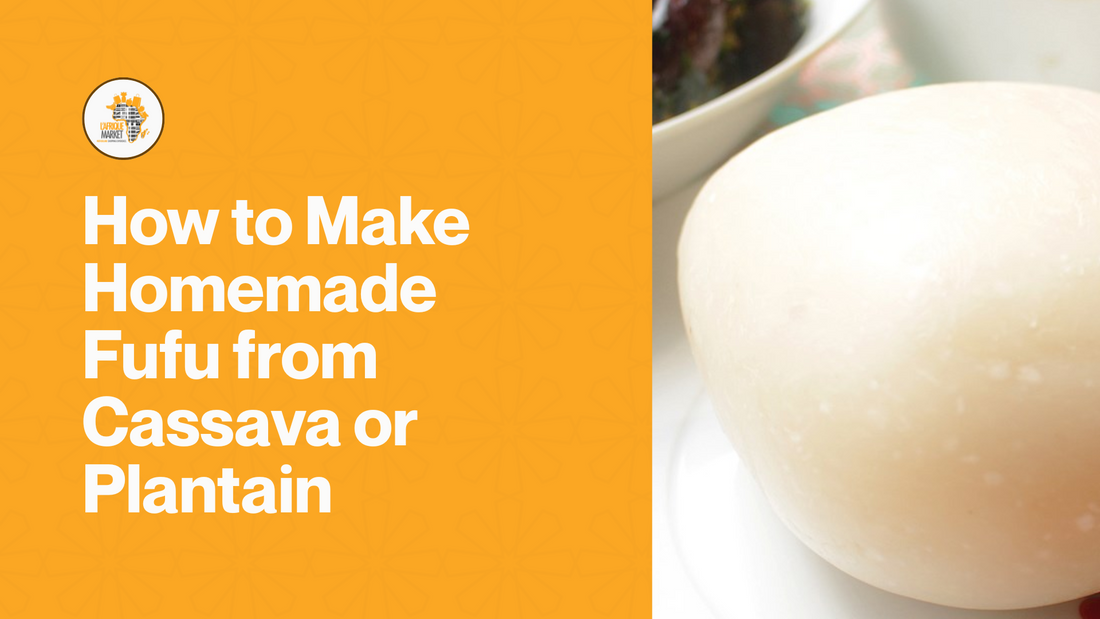
How to Make Homemade Fufu from Cassava or Plantain
Share
Fufu is a beloved staple across much of West and Central Africa—a soft, stretchy, and mild-flavored side dish that perfectly complements hearty soups and stews. Traditionally pounded from starchy vegetables like cassava, yams, or plantains, fufu is more than just food; it’s comfort, culture, and connection.
If you want to make authentic homemade fufu using cassava and plantain, here’s a straightforward guide to help you recreate this soul-satisfying dish in your kitchen.

Image from: We Eat At Last
Ingredients You’ll Need
- 1 medium cassava tuber (also called yuca)
- 2 green (unripe) plantains
- Water (enough to cover the vegetables for boiling)
- Optional: Salt (to taste)
Also read: How L'Afrique Market is Preserving Culture Through Food
Step 1: Preparing the Cassava and Plantain
- Peel the cassava, taking care to remove the tough outer skin and the fibrous core inside.
- Peel the green plantains—the ones you want are unripe and firm.
- Cut both cassava and plantain into medium-sized chunks for even cooking.
- Rinse thoroughly to remove any dirt or sap.

Image from: Research Gate
Step 2: Cooking the Vegetables
- Place the cut cassava and plantain into a pot.
- Add enough water to barely cover them.
- Bring to a boil and cook over medium heat for about 30 minutes or until both are fork-tender.
- Drain the water and allow to cool slightly.

Image from: Cook with Mom
Step 3: Mashing or Blending into Fufu
You have two options: traditional pounding or modern blending.
Traditional pounding:
- Using a mortar and pestle, pound the cooked cassava until smooth and stretchy.
- Pound the plantain separately until smooth.
- Combine both until you get a uniform, dough-like mixture.
Image from: Facebook
Using a blender or food processor:
- Add cassava and plantain pieces to a blender.
- Blend until smooth, adding small amounts of water as needed to get a soft, stretchy texture.
- Pour into a bowl, wet your hands, and knead or fold the mixture until smooth.

Image from: All Nigerian Recipes
Step 4: Final Touches
- Shape your fufu into balls or one large dome.
- Serve immediately while warm alongside your favorite Ghanaian soups or stews such as groundnut soup, light soup, or palm nut soup.

Image from: iStock
Tips for Perfect Fufu
- Consistency matters: The ideal fufu is soft, stretchy, and sticks together without being gummy or mushy. Adjust water quantity accordingly.
- Peeling plantains: Score the peel lengthwise to make peeling easier, or soak peeled plantains in hot water for a few minutes.
- Safety note: Raw cassava contains compounds that can be toxic if not properly cooked—always boil thoroughly.
- No pounding? If you don’t have a mortar and pestle, blending and kneading work wonderfully and saves time.
While homemade fufu from cassava or plantain brings a true taste of tradition to your kitchen, you don’t always have to start from scratch. L’Afrique Market also stocks high-quality cassava and plantain fufu flours—making it easy to enjoy authentic fufu with far less prep.
Some Cassava and Plantain Flour We Stock
and a lot more. Just mix the flour with water and cook to your desired texture, saving time while still keeping those cherished flavors on your table.
Whether you choose fresh ingredients or the convenience of fufu flours, you’ll find everything you need at L’Afrique Market to enjoy delicious, authentic African meals any day of the week!
